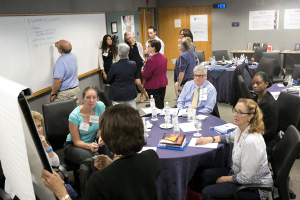
The School of Medicine’s Office of Diversity and Inclusion works with the medical school leadership to foster and influence an inclusive climate in which all constituents across the School of Medicine experience a genuine sense of belonging, engagement and achievement. The Office recently launched an Inclusion Council.
The goals of the council are trifold:
- Help prioritize School of Medicine diversity and inclusion goals and strategies;
- Serve as an advisory “think tank” for the Office of Diversity & Inclusion;
- Act as a liaison for department/institute/center’s goals, strategies, questions and concerns.
The newly formed Inclusion Council is comprised of faculty and staff across the School representing a diversity of perspectives, backgrounds, experience, and identities that include but are not limited to: gender, race/ethnicity, research/clinical, nationality, socioeconomic status, age, role/function, religion, length of service, sexual orientation, educational background/training, gender identity, thinking style, ability, language, and perspective.
On July 30 and 31, the Office hosted a training session for new council members. Howard J. Ross, a national thought leader on organizational change, cultural competency and unconscious bias and author of “Reinventing Diversity: Transforming Organizational Community to Strengthen People, Purpose and Performance” facilitated an intensive orientation session for council members. The content of the training focused on re-thinking the historical paradigms of diversity, exploring a systems based approach to culture change and an in depth look at the brain science of unconscious bias.
“I’m extremely excited about this council and the opportunity to build a community of practice to foster greater inclusion” said the school’s Chief Diversity Officer, Judy Seidenstein. “There is a wealth of knowledge and experience represented on the team and a strong desire and collective commitment to think deeply, learn from and with each other, discuss the “undiscussables” and take strategic action to increase inclusion across the school of medicine’s people, practices and processes.”
According to Howard Ross, the most successful way to impact this type of culture change involves gathering a strong diverse group of people who reflect a microcosm of the organization into an ongoing team that includes senior leaders who can help guide the process. Ross says that a critical factor is that the people on the council have an opportunity to create a sense of community among themselves and create alignment before they start doing their work for the organization”. Based on this, it sounds like this council is off to a great start!